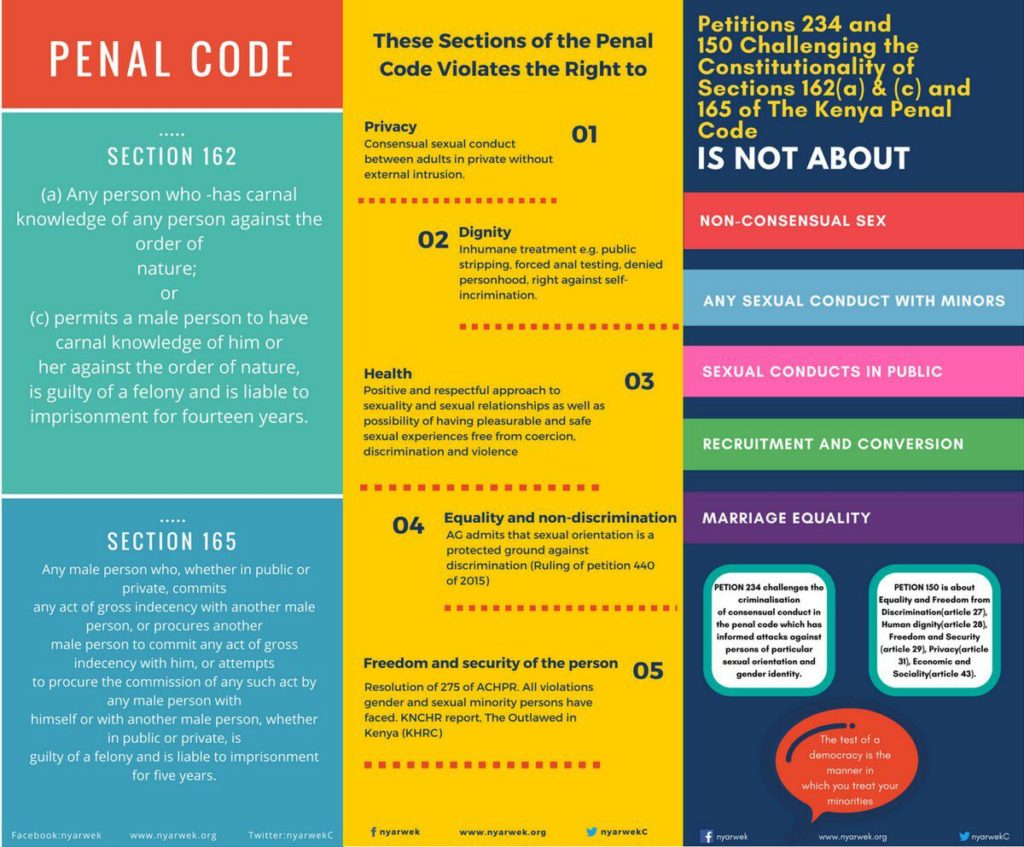
Decriminalisation of Consensual Same Sex Sexual Conduct in Kenya
On the 22nd, 23rd February and 1st March 2018, petitions 150 of 2016 consolidated with petition 234 of 2016 challenging the constitutionality of section 162 a), c) and 165 of the Penal Code of Kenya were heard before a 3-judge bench at the Milimani High Court of Kenya.
The Petitions filed in 2016, ask the court to declare these sections of the law unconstitutional and in violation of rights guaranteed to all Kenyans in Chapter Four – Bill of Rights of the 2010 Constitution of Kenya. These rights include: the right to privacy, dignity, health, equality and non-discrimination and freedom and security of the person.
The Gay and Lesbian Coalition of Kenya (GALCK), the National Gay and Lesbian Human Rights Commission (NGLHRC) and the Nyanza Rift Valley & Western Kenya Network (NYARWEK) argued that the existence of these laws within the Penal Code validate stigma, discrimination and violence towards individuals who do not conform to society’s expectations on gender identity, gender expression or sexual orientation. These individuals include lesbian, gay, bisexual, transgender and queer (LGBTQ). The use of these old, colonial era laws to discriminate against a subset of Kenyans goes against the supreme law of Kenya—the constitution.
Over 1,000 incidents of violations against LGBTQ people since 2014 have been documented — ranging from murder to mob violence, verbal assault, rape, blackmail and extortion.
“We receive cases of women who have been brutally beaten and raped because their family or neighbors found out they were lesbian. Or incidents where individuals go to the police seeking help only to have the police attack them. In one such case where our client tried to report a robbery, he was pushed into a cell by police officers, forcibly undressed, beaten, choked and had his hair shaved and burnt off because he ‘was dressed very gay.’ These are not the national values Kenyans aspire to.”
The disputed sections of the Penal Code were introduced by British colonizers in 1897 and make vague reference to “carnal knowledge against the order of nature” and “gross indecency” Such that they not only discriminates against adult men who consent to private sexual acts, but also make unlawful sexual acts that don’t result in the production of offspring. Punishment for breaking these laws is up to fourteen years’ and five years’ imprisonment respectively.
“We have a constitution that carries the will of the Kenyan people and that says no one should be discriminated against,” Eric Gitari states, “yet these laws do just that.”
GALCK, NGLHRC and NYARWEK and other partners, friends and allies will attend court on April 26th at the Milimani Law Courts in Nairobi where further direction regarding these petitions will be provided by the judges. If successful, the petitions have the potential to change the tide for Sexual Orientation, Gender Identity and Expression in Kenya and on the African continent.
